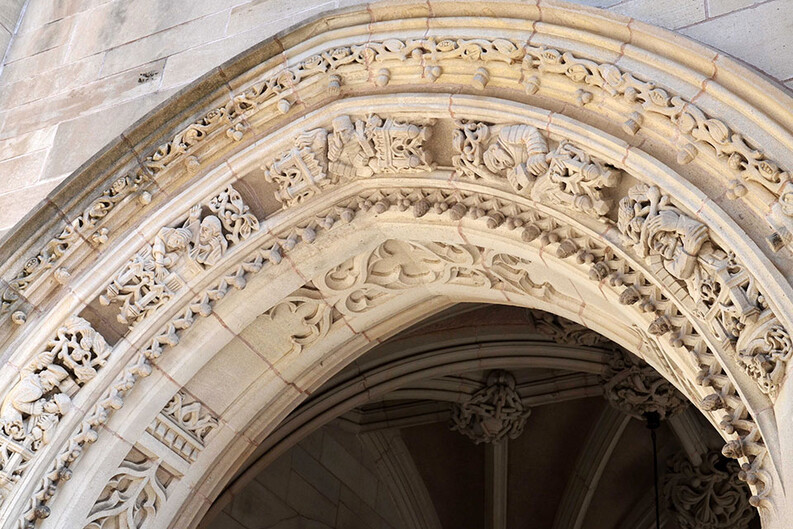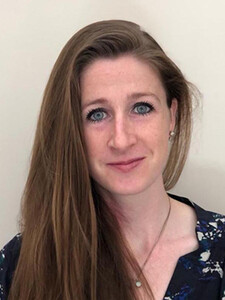Schell Center Fellow Spotlight: Kristine Beckerle ’15

Kristine Beckerle ’154 is the Cover-Lowenstein Fellow at the Orville H. Schell, Jr. Center for International Human Rights, a Clinical Lecturer in Law, and an Associate Research Scholar at Yale Law School. Her work focuses on international humanitarian law violations and international human rights abuses during conflict, with a specific focus on pathways towards credible investigations, accountability and reparations for mass violations, and opportunities for international solidarity in human rights work.

KB: Last year, I supervised a project with the Lowenstein Clinic in partnership with a group called Mwatana for Human Rights, a Yemeni-based and Yemeni-run organization. I worked with them in Lebanon before beginning my fellowship here at Yale, so it was really nice to work with them in this new capacity and keep that relationship going. Four clinic students worked with us throughout the academic year, and we produced an in-depth analysis5 making the case for reparations for Yemen. It was really lovely for me to get to do this with the clinic since it’s something that I’ve been working on for the last four years, at least. The students were all fantastic and brought new perspectives and questions to how Mwatana and I have been thinking about the arguments. It was an ambitious project because a lot of accountability work in the human rights space focuses on courts and criminal justice. We were trying to figure out if we could use the genre of the traditional human rights report to center this conversation around reparations.
Q: Does any of your current work expand on this report?
KB: One of the things I’m doing right now grew out of that project. I want to see if there are ways in which groups of civil society organizations in Yemen and working on Yemen regionally and internationally can better collaborate and coordinate on justice and reparations questions. I’m trying to bring together different civil society groups on Yemen reparations to understand where we can partner, strategize together, and support each other’s work in more ambitious ways. If the Yemeni government, other states and various United Nations’ bodies fail to create a criminal justice or reparations mechanism for Yemen, for example, what can civil society do in the absence of such support that meaningfully moves the ball forward? I’m spending a lot of time talking to different civil society groups and trying to figure out what that might look like and what kind of useful models might exist elsewhere. There’s been a lot of interesting experimentation.
Q: What does this work look like in academia?
KB: On the academic side, there are two projects I’m working on. One project involves trying to figure out what international law and international institutions can offer in terms of nudging warring states to provide remedies, including reparation, to civilians harmed by international wrongs, and to what extent U.N. human rights bodies are engaging on or developing visions of accountability for war-time wrongs that move beyond prosecutions of individuals responsible for international crimes. For Yemen, for example, the U.N. Human Rights Council in Geneva became something of a center of gravity for Yemen-justice debates. The Council’s decisions have no official power to bind warring states, but the fact that the Council was discussing Yemen every year and created a U.N.-mandated investigation into warring parties’ actions, positively influenced warring States, including Saudi Arabia, the UAE and Yemen, to increasingly respond to civilian harm that they were causing in Yemen. Ultimately, it is far less than credible justice but it is much more than zero. The project is trying to explore both what we can hope for from international institutions interacting with wrongdoing states in facilitating compliance with international humanitarian law and international human rights law on remedy, as well as the limitations of the law itself, which was created by States, in providing what people most affected might consider justice.
Q: What’s the second academic project you’re pursuing?
KB: My other project is a collaborative endeavor with an amazing clinical professor who has herself engaged on Yemen as both a practitioner and academic. We’re looking at two transnational advocacy campaigns in the context of the Yemen conflict and thinking about the participants in these campaigns, the goals they set themselves, the tools and tactics they used, and the internal and external power structures that impacted their effectiveness. In one campaign, for instance, there was significant Global North-Yemeni collaboration; in the other, there was far less. There was less South-South collaboration in both. How effective were these campaigns in creating their desired policy changes and how effective were they in building out a more equitable human rights movement? If a human rights advocacy campaign achieves its policy goal, does that necessarily mean it has helped build out the wider movement, or are these two aims sometimes in tension?
Q: Could you talk about your experience teaching “Human Rights Theory and Politics” in Yale College?
KB: “It was one of the best things that I did last year. The students were so thoughtful and surprised me with the questions they would ask. I really enjoyed thinking through aspects of politics, history and human rights theory that I haven’t returned to in many years with them. It was optimism-inducing. It was also cool to consider interdisciplinary approaches to human rights, because I actually do think that human rights is not just law. The students had such varied interests and majors and ways of thinking about the world. It was a gift, too, that there were people in the class who were willing to share ideas that they weren’t sure about and think through them together.”
Q: Are there any other details about your fellowship that you’d like to share?
KB: I’m so grateful for [Professors] Jim Silk, Hope Metcalf, and the Lowenstein Clinic. They are the primary reason I came back here. And it was only after coming back as a fellow that I realized that parts of the way I think about the world are very much “Jim” and very much “Hope,” and that I better appreciated that their differences helped make the clinic as it was. As a student at Yale, I wasn’t always fully cognizant of how much I was taking in, especially around approaches to the human rights world and the importance of humility in creating change. My Yale Law experience was very much dominated by the Lowenstein Clinic, as well as my work with Professor Owen Fiss and the Middle East Legal Studies seminar. I really appreciated having faculty who were supportive of me and who would get excited and express enthusiasm about my next steps, even when those next steps remained nebulous and subject to change.


